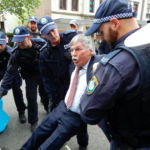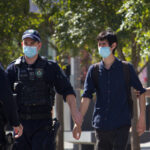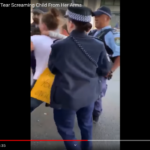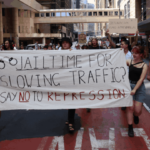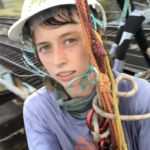Midnight House Arrest Politically Motivated, Says Student Housing Activist Cherish Kuehlmann
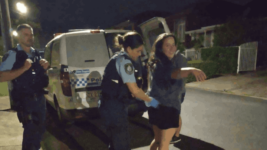
UNSW SRC education officer Cherish Kuehlmann had four NSW police officers bash on the front door of her Eastlakes apartment at midnight last Saturday and arrest her in relation to a housing crisis protest directed at major banks in Sydney’s Martin Place the day prior.
Kuehlmann considers the arrest was staged in such a dramatic manner as to cause the most impact in sending a message to those contemplating similar actions, which, taken on the back of the oppressive crackdown on protest in this state over the last 12 months, sounds about right.
This is especially so, the uni student advises, because police officers present at the nonviolent demonstration calling out soaring rents and mortgages triggered by interest rate rises, were speaking with her after the protest, so any transgression made could have been dealt with then.
Last Friday’s housing rally saw university students occupying the foyer of the Commonwealth Bank in Martin Place and the curtilage of the Reserve Bank of Australia on Macquarie Street. And Kuehlmann was arrested about 9 hours later out the front of her suburban home.
The war on protest
For the crime of standing on the Reserve Bank curtilage and calling for social justice, Kuehlmann has been charged with aggravated trespass, contrary to section 4B of the Inclosed Lands Protection Act 1901 (NSW), which carries a maximum fine of $5,500 when non-agricultural land is involved.
This offence was enacted by the Baird government in 2016. Designed to counter activists protesting against fossil fuel facilities, it saw the penalty applying increased tenfold, and it was then beefed up in 2019, so as to target animal rights activists staging actions against agribusiness with prison time.
As is the habit of police these days, Kuehlmann had to agree to extreme bail conditions, including that she not enter within a 2 kilometre radius of Sydney Town Hall, in exchange for being released from the Day Street Police Station lockup after spending four early hours of Saturday morning in a cell.
Indeed, the Perrottet government has been waging a campaign against climate protests, which commenced last March, when it passed severe laws to stamp out unauthorised disruptive actions and established a police unit targeting them, which Kuehlmann’s arrest shares all the hallmarks of.
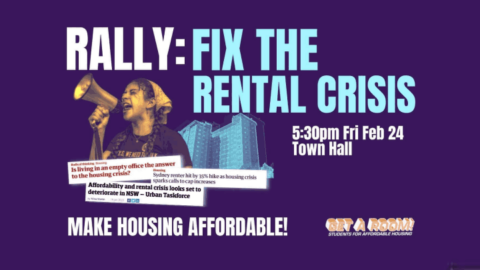
A burgeoning crisis
The decade-long crisis in housing in this state has escalated to a point where, some say, it has not been this dire since the Great Depression. And affordable housing demonstrations in the Sydney CBD are becoming a weekly event.
While a defiant Kuehlmann says her arrest will not silence the burgeoning student movement against rises in rent, mortgages and homelessness, which is evidenced by the Fix the Rental Crisis snap rally being organised by the Get a Room campaign for this Friday afternoon.
Sydney Criminal Lawyers spoke to UNSW SRC education officer Cherish Kuehlmann about NSW police waiting until midnight Saturday to arrest her at home, the reasons students are targeting the banks, and why concerned citizens ought to join the housing rally this Friday.
Last Saturday at midnight, NSW police officers turned up at your home, arrested you and locked you in a cell until 4 am. You were charged with aggravated trespass and officers imposed some extreme bail conditions.
Cherish, how do you consider what happened to you?
It’s outrageous the police are out to protect people like Philip Lowe and politicians by arresting me in the middle of the night.
They’re trying to intimidate me and other young people protesting against the housing crisis.
It was politically motivated to come to my house at midnight, bang on my door and arrest me in front of neighbours and onlookers, then take me to the police station in the middle of the night and lock me in a cell for four hours.
That was politically motivated. They spoke to me at the protest, and said they weren’t detaining me and that I could go.
So, the police told you that on Friday?
After it ended, the USYD education officer and I spoke to police. They asked for our names and dates of birth. We then asked if we were being arrested, and they said we weren’t.
We were asked to leave, and they told us we could if we provided our name and address, which we did, and then we left.
You were the only individual arrested out of what looked to be a fair few student protesters. Why were you singled out?
I was on the megaphone, and I was leading the chants and the speakers.
The arrest took place after you’d participated in a student protest staged against both the Commonwealth Bank and the Reserve Bank of Australia in Martin Place.
You were specifically arrested in relation to being on the curtilage of the Reserve Bank. What have you been accused of doing to warrant your arrest?
They’re accusing me of aggravated trespass, which is a serious offence. They said it was because the curtilage outside of the Reserve Bank of Australia is considered Commonwealth property.
The offence is aggravated because they claim the protest disrupted the flow of business into the Reserve Bank. So, apparently, I’ve supposed to have stopped them from raising interest rates further, or something like that.
We were staging a protest to raise awareness to the profit that banks are making and the rent crisis that workers and students are facing.
So, how do the banks contribute to the housing crisis?
The Commonwealth Bank of Australia posted a six month $5 billion profit, which is a record surplus for them, and they said it is directly off the back of higher interest rates.
Philip Lowe, the governor of the Reserve Bank, is being publicly grilled right now for his role in increasing interest rates, which has pushed mortgage repayments up immensely for working class people.
These increases have led to landlords seizing the opportunity to increase rents.
Lowe said that banks are profitable and that’s good for us. But we need to ask who that’s good for.
The rich and powerful in Australia have mansions and multiple investment properties, while students and workers are stuck with huge rent increases, mouldy apartments and threats of eviction.
The cost of living is outrageous and private developers are robbing young people of their futures.
You’ve been charged with aggravated trespass for taking part in a nonviolent direct action raising awareness around the escalating housing crisis, so how are you feeling about this?
I’m incredibly outraged, to be honest. The police are trying to intimidate me. And it’s not just an attack on me, but it’s an attack on the right to protest in NSW, as well as people facing rent increases, being evicted or experiencing homelessness.
Even though they put me in a tiny prison cell for hours and hours and forced these bail conditions on me, I won’t stand for this, and I’ll continue to fight against the housing crisis.
I’m doing my utmost to get a lawyer and be in front of a magistrate to strike out the bail conditions, so I can still chair the rally on Friday.
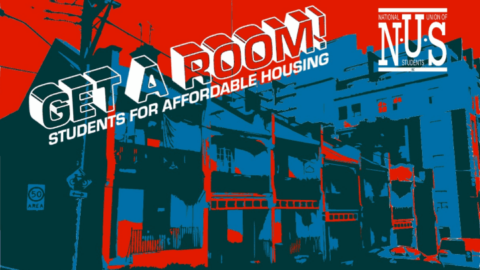
As you’ve hinted at there, your arrest hasn’t slowed the student campaign against the escalating housing crisis.
The Fix the Rental Crisis: Make Housing Affordable snap rally is being held at Sydney Town Hall this Friday afternoon.
So, Cherish, why should people get out there and rally against the housing situation in this state?
People should show up on Friday, as students have always fought back, and we’re determined to continue doing so.
We can play a real role in drawing attention to the rental crisis facing young people right now.
We need to draw attention to the billions of dollars that the banks have made, which could be used to build affordable housing.
Universities should use their institutional weight to provide low-income housing to students, instead of doing dodgy deals with housing developers like Scape and Iglu.
The current situation we’re in right now is a problem of housing being a commodity and not something that’s given to people because they need it.
This a direct product of the policy of both NSW Labor and Liberal governments that have been benefiting private developers and landlords, rather than renters and low-income households.
The government has been selling off public housing for years. Millers Point is one of the most unoccupied suburbs in the city. One in three homes are now empty. That’s crazy.
They sold off public housing to developers and there’s now 20,000 Airbnb properties, which could be seized and used for people who are desperate for rentals.
The government won Millers Point. But there are still people defending their homes in Glebe and Waterloo.
These campaigns are being carried out by existing activists and campaign groups. But the crisis is acute for students now too.
So, as education officer and through the National Union of Students, we’re trying to mobilise students around this issue, as they can play a real role in drawing attention to it and demanding that politicians implement rent freezes and rent caps.
They should put more money into public housing and tax the rich.
So, the NUS has called a snap action at 5.30 pm at Sydney Town Hall this Friday, which is being organised by the campaign Get a Room: Students for Affordable Housing.
This is to fix the rental crisis and we are going to continue to keep fighting against those responsible for this.


